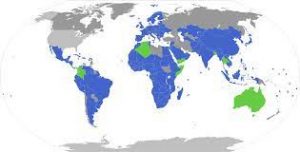Nagoya Protocol:

Cameroon recently adopted the Nagoya Protocol on Access and Benefit Sharing
- The Nagoya Protocol on Access to Genetic Resources and the Fair and Equitable Sharing of Benefits Arising from their Utilisation (the Protocol) is a legally binding global agreement that implements the access and benefit-sharing obligations of the Convention on Biological Diversity (CBD).
- It was adopted by the CBD in Nagoya, Japan, in October 2010 and entered into force on October 12, 2014, 90 days after the deposit of the fiftieth instrument of ratification.
- It provides a transparent legal framework for the effective implementation of one of the three objectives of the CBD: the fair and equitable sharing of benefits arising out of the utilisation of genetic resources.
- It establishes a framework that helps researchers access genetic resources for biotechnology research, development, and other activities, in return for a fair share of any benefits from their use.
- This provides the research and development sector with the certainty they need to invest in biodiversity-based research.
- Indigenous and local communities may receive benefits through a legal framework that respects the value of traditional knowledge associated with genetic resources.




